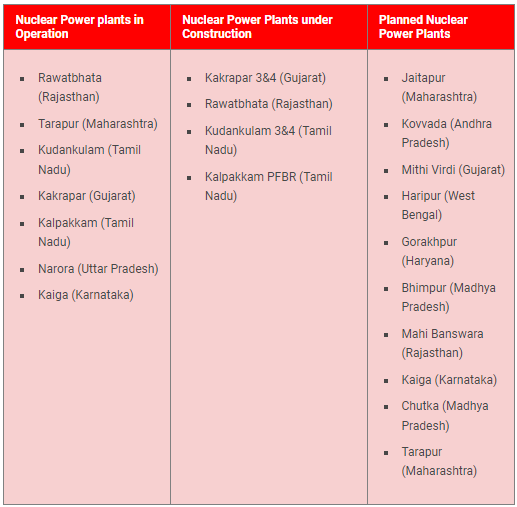Science & Technology
Nuclear Energy & Climate
- 01 Dec 2021
- 6 min read
Why in News
According to a recent study published by the Global Carbon Project (GCP), the global carbon dioxide (CO2) emissions are set to soar 4.9% in 2021, compared with the previous year. This calls into question the world’s efforts to tackle the climate crisis.
- The energy sector continues to be the largest emitter of greenhouse gases, with a share of 40% — and rising. In this context, nuclear energy is touted as a non-polluting option.
- However, the scientific community is divided on the opinion of replacing nuclear energy with fossil fuel to tackle climate change.
Key Points
- Pros of Nuclear Energy:
- Non-Intermittent Power Supply: The consistent criticism of renewable energy like wind and solar is that they only produce power when the wind is blowing or the sun is shining.
- Nuclear power, however, is not intermittent, as nuclear power plants can run without any interruptions for a year and more without interruptions or maintenance, making it a more reliable source of energy.
- Cheaper to Run: Nuclear power plants are cheaper to run than their coal or gas rivals.
- It has been estimated that even factoring in costs such as managing radioactive fuel and disposal nuclear plants cost between 33 to 50% of a coal plant and 20 to 25% of a gas combined-cycle plant.
- Achieving Target of Paris Agreement: With the adoption of the Paris Agreement in 2015, it is essential for all countries to control GHG emissions and limit the increase of global mean surface temperature by the end of the century to below 2°C relative to pre-industrial levels.
- Nuclear power can play an important part in meeting climate pledges.
- Non-Intermittent Power Supply: The consistent criticism of renewable energy like wind and solar is that they only produce power when the wind is blowing or the sun is shining.
- Cons of Nuclear Energy:
- Nuclear power is Not Emissions-Free: Depending on the process of electricity generation, or take into account the entire life cycle of a nuclear power plant, the nuclear energy also produces CO2 emissions.
- A report released in 2014 by the UN’s Intergovernmental Panel on Climate Change (IPCC), for example, estimated a range of 3.7 to 110 grams of CO2 equivalent per kilowatt-hour (kWh).
- Further, new nuclear power plants generate more CO2 during construction than those built in previous decades, due to stricter safety regulations.
- Poor Than Other Renewable Alternatives: If the entire life cycle of a nuclear plant is included in the calculation, nuclear energy certainly comes out ahead of fossil fuels like coal or natural gas.
- However, the picture is drastically different when compared with renewable energy.
- According to several data, nuclear power releases many times more CO2 per kilowatt-hour than photovoltaic solar panel systems, wind and hydro power.
- High Initial Cost: Nuclear power plants are about four times as expensive as wind or solar, and take five times as long to build.
- Further, it takes too long for nuclear energy to become available (time taken to reach criticality).
- Thus, nuclear energy requires high inputs to have a noticeable effect on climate change.
- Effect of Climate Change on Nuclear Energy: Nuclear energy itself has been affected by climate change.
- During the world’s increasingly hot summers, several nuclear power plants have already had to be temporarily shut down or taken off the grid.
- Further, nuclear power plants depend on nearby water sources to cool their reactors, and with many rivers drying up, those sources of water are no longer guaranteed.
- Threat of Nuclear Accident: Anti-nuclear campaigners will cite the three major nuclear meltdowns of recent times, Three Mile Island in 1979, Chernobyl in 1986 and most recently Fukushima in 2011.
- Despite all the safety measures in place for these nuclear plants, different factors caused them to go into meltdown, which was devastating for the environment and for local inhabitants who had to flee the affected areas.
- Nuclear Waste: One side effect of nuclear power is the amount of nuclear waste it produces.
- Nuclear waste can have drastically bad effects on life, causing cancerous growths, for instance, or causing genetic problems for many generations of animals and plants.
- Nuclear power is Not Emissions-Free: Depending on the process of electricity generation, or take into account the entire life cycle of a nuclear power plant, the nuclear energy also produces CO2 emissions.
Status of Nuclear Energy in India
- India has consciously proceeded to explore the possibility of tapping nuclear energy for the purpose of power generation.
- In this direction a three-stage nuclear power programme was formulated by Homi Bhabha in the 1950s.
- The Atomic Energy Act, 1962 was framed and implemented with the set objectives of using two naturally occurring elements Uranium and Thorium having good potential to be utilized as nuclear fuel in Indian Nuclear Power Reactors.
Way Forward
- The combination of excessive costs, environmental consequences and lack of public support were all arguments against nuclear power.
- However, nuclear energy has its advantages too.
- Therefore, countries should deliberate to make use of a mix of renewable energy wherever possible.
- Thorium based Nuclear energy should be made viable as soon as possible.





